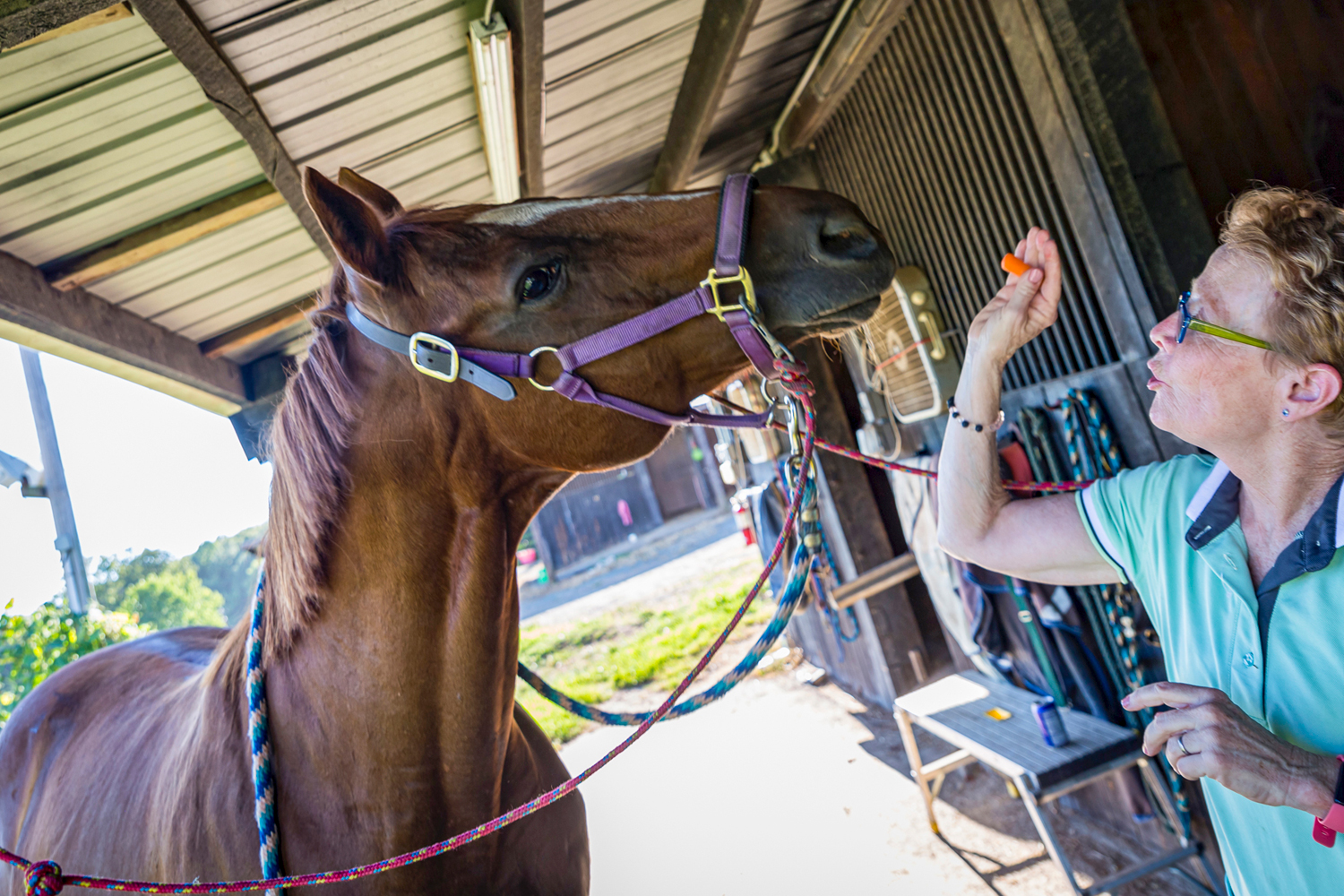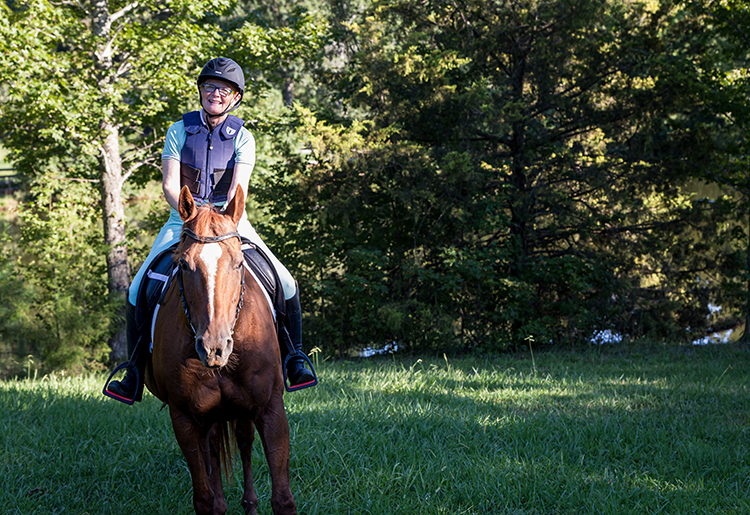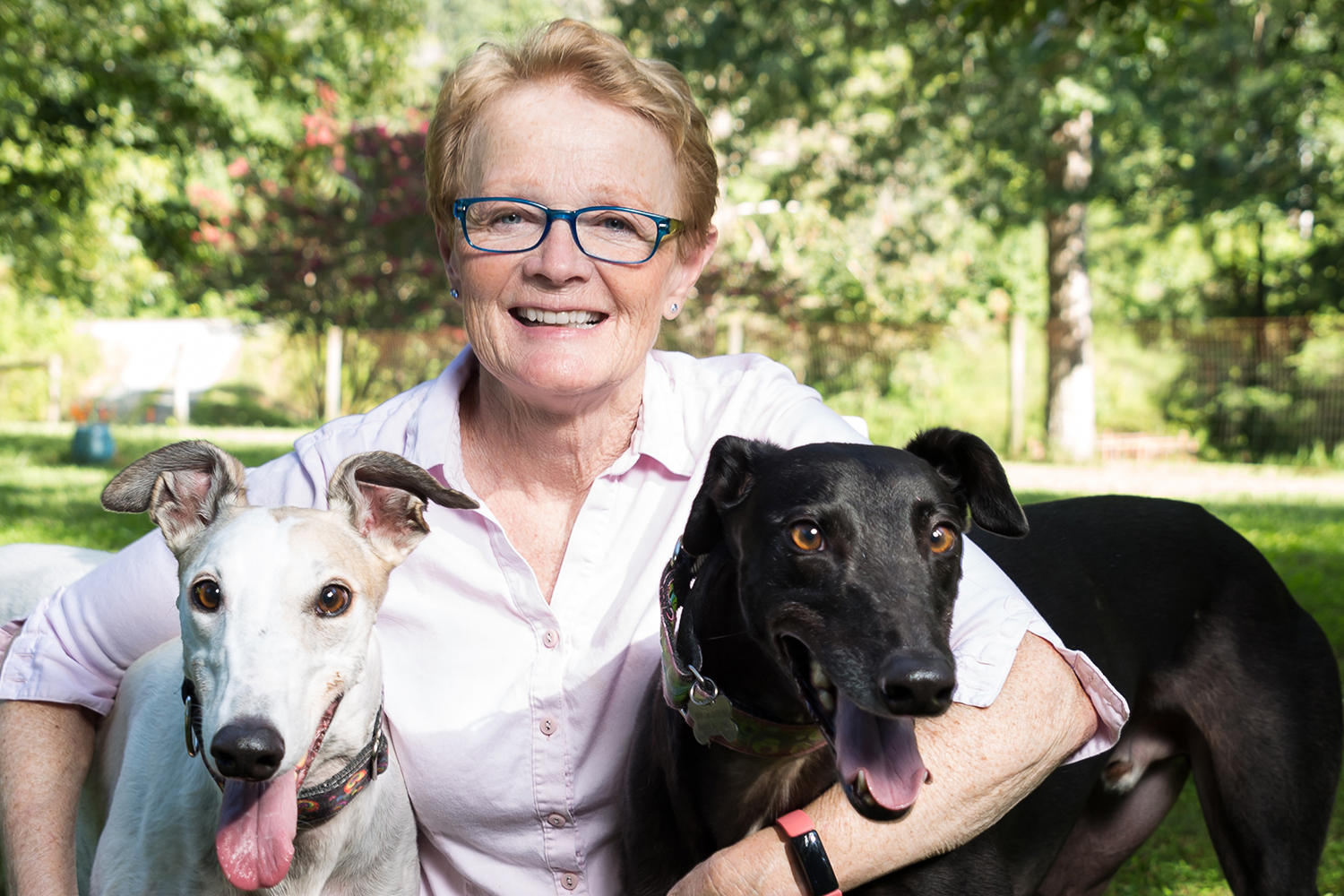AN AVID SWIMMER AND EQUESTRIAN, Laurie Betts remembers receiving the call with results from a biopsy of a nodule in her esophagus in 2018. When she heard the words esophageal cancer, she ran down the hallway in her home in Mebane, North Carolina, and threw down the phone. “I remember thinking, ‘This is one of the bad ones,’” she says.
Betts, now 66, is a molecular biologist who studies the structure of proteins at Lineberger Comprehensive Cancer Center at the University of North Carolina (UNC) in Chapel Hill. She knew that esophageal cancer often is lethal. Roughly one in five people with cancer of the esophagus—the tube that moves food and liquid from the throat to the stomach—survives five or more years after diagnosis. Prognosis is especially poor for people whose cancer has spread beyond the esophagus. But as unlucky as she was to have cancer, Betts was also fortunate because her cancer was found early. Just 18% of esophageal cancer cases are caught before the cancer has spread, and nearly half of people with localized esophageal cancer survive beyond five years.
Esophageal cancer causes few symptoms in its earliest stages—although people with Barrett esophagus, a condition in which acid reflux has led to abnormal changes in the cells lining the esophagus, are routinely screened with an upper endoscopy, a procedure that uses a scope and camera to visualize the digestive tract. One of the telltale signs of esophageal cancer is difficulty swallowing, says Michael Meyers, who was Betts’ surgical oncologist at UNC Health in Chapel Hill, North Carolina. Still, by the time a patient experiences this and other symptoms, the cancer has typically progressed to a point where it is difficult to treat.
Betts’ cancer was found during an endoscopy after she went to the doctor complaining of gastrointestinal issues. Doctors would later diagnose her with irritable bowel syndrome, but they also noticed a nodule in her esophagus and sent a tissue sample to pathology to be analyzed. The initial biopsy was negative. But a second, more extensive biopsy revealed the nodule was cancerous. In November 2018, she was diagnosed with stage I esophageal squamous cell carcinoma, a type of esophageal cancer that forms in the flat cells that line the inside of the esophagus.
Besides her stomach issues, Betts felt fairly healthy at the time. She rode her horse a few times a week and frequently swam laps in the pool. Still, she had a history of smoking and heavy drinking—habits that increase the risk of developing esophageal cancer. As a teenager, she also struggled with bulimia and says she started abusing alcohol as an adult to manage stress. “I quit the bingeing and purging and started drinking. At some point in grad school, I realized that I was becoming less functional and couldn’t study for all the exams that way,” Betts says. She entered a 12-step recovery program, which would not only allow her to get a handle on her addiction, but would also help her through cancer years later. The guiding principles of the recovery program prompted her to seek out patient support groups and to give back through patient advocacy.
Treatment Decisions
In patients with early-stage esophageal cancer, chemotherapy and radiation typically are administered as a first step to shrink the tumor before surgery to remove the cancer. In December 2018, Betts started a seven-week course of chemoradiation, which meant she would receive both chemotherapy and radiation. She came for treatment five days a week at Lineberger Comprehensive Cancer Center. Her husband, Dan Svoboda, felt encouraged by the oncology team’s optimism. “When we had the first meeting with the team, I remember them saying, ‘We are going for a cure,’ and that’s just what I hung onto,” says Svoboda.
Betts experienced some hair loss from the chemotherapy, but radiation was harder, making the act of swallowing painful. She avoided taking opioids, however, due to her history of addiction. “It didn’t feel good sometimes, but I drank a lot of Ensure and ate things that were soft,” she says.

When Laurie Betts received radiation and chemotherapy, she drew comfort from frequent visits to her horse, Jo Jo, at a stable a few miles from her home. Photo by York Wilson
In March 2019, about a month after her final radiation treatment, scans showed no evidence of disease. Meyers notes that squamous cell carcinoma tends to be more sensitive to radiation than other forms of esophageal cancer. He told Betts there was a good chance that she would have a durable response to chemotherapy and radiation alone, meaning the cancer wouldn’t come back. Yet, he recommended surgery in addition to chemotherapy and radiation—the standard of care for early-stage esophageal cancer in most circumstances—for the best chance at a cure.
The surgery, called an esophagectomy, carries significant risks of complications. All or part of the esophagus is cut out and reconstructed using part of another organ, such as the stomach. Short-term complications include wound infection and leakage at the surgical site. In the long term, patients who undergo an esophagectomy often experience chronic acid reflux and difficulty digesting food because the size of the stomach is reduced. Betts wasn’t sure she wanted to go ahead with the operation. “I thought, ‘Why go through all that if there’s a chance I don’t need surgery?’” Betts says.
Meyers went over the benefits and risks of the surgery. “When we walk a patient through the pros and cons, we explain why surgery is the standard of care and what are the downsides of not doing it,” says Meyers. “But we also weigh alternative options in helping a patient make the right decision for them.”
Betts ultimately opted for watchful waiting, not surgery. She had a CT scan or endoscopy three or four times a year for the first three years to monitor for signs of cancer and continues to be monitored. Although she still worries before these procedures and while waiting for the results, she does not regret her decision. “I’ve had three great years,” she says. According to Meyers, the chance of recurrence this long after treatment is quite low.
One Day at a Time
Betts notes that her previous experience overcoming an eating disorder and getting help with alcoholism helped to provide a strong framework for her recovery from cancer. “I had already made it through some difficult times,” she says. “I was scared, but I knew how to move forward and function.” She turned to a popular recovery program principle, “one day at a time,” and looked to find support and community.

Laurie Betts is back to her favorite hobbies, including riding Jo Jo, a great-granddaughter of Triple Crown-winner Secretariat. Photo by York Wilson
During treatment, Betts initially leaned on her husband, two sisters and close friends to keep her mind from wandering to worst-case scenarios. She also resolved to keep doing things that brought her joy. Betts visited her horse, Jo Jo, even on days when she didn’t have the energy to ride her. Jo Jo, a great-granddaughter of Triple Crown-winner Secretariat, lives at a stable about five miles from Betts’ house. “Just touching her fur felt so good. It was a great way to get my mind off worrying,” she says.
Betts cut back her hours in the lab at UNC but kept working—an adjustment that helped her feel she was “continuing to contribute to the world in a small way.”
Betts lives in a semirural part of North Carolina, surrounded by beef and dairy cattle farms. She loves the peace and quiet of her surroundings and watching the birds on and around her property. A few months after finishing treatment in the summer of 2019, she took a bucket-list solo trip to Iceland to bird-watch and added many new species to her life list, a record that birders keep of all the bird species they have seen. “It was the trip of a lifetime,” Betts says.
But when COVID-19 shutdowns hit the U.S. in March 2020, Betts—who describes herself as an outwardly “sunshiny person who has dark moments”—sat on her porch and felt overwhelmed. “I thought, ‘This is the end of the world,’” she says.
Between worrying about the cancer returning and avoiding COVID-19 infection, Betts still experiences anxiety and depression, but she uses the skills she learned from her recovery program to help her get through it. An important aspect of the 12-step program for Betts had been going to meetings and getting “the sense of people who had been through the same thing helping each other,” she explains. So, she began to search for a similar community for cancer survivors. A psychiatric nurse at UNC connected Betts with a newly formed facilitator-led virtual support group for people who finished treatment and were dealing with cancer survivorship issues. “Like any peer support group, you just don’t feel nearly as alone,” says Betts, who still attends monthly meetings online with plans to meet in-person.
Giving Back
Being a part of the community also requires helping that community. “In the 12-step program, we learned that you have to give it away to keep it. You have to help people if you want to keep getting help yourself,” Betts says.
In 2020, Betts joined a patient advocacy group at Lineberger Comprehensive Cancer Center that she had learned about from another patient during radiation treatment. The group helps provide patient perspectives to cancer researchers so they can build better cancer clinical trials. Betts was immediately drawn to this calling. “I could use my scientific background to be a translator between patients and researchers,” she says.
Environmental factors affect what type of esophageal cancer is most common in different countries around the world.
In the United States, esophageal cancer is the 17th most common cancer, making up about 1% of all cancers in the country. In other parts of the world, especially in Africa and Asia, the condition is more common. In Bangladesh, it’s the leading cause of cancer death among men and women, and in Malawi, it’s the leading cause of cancer death among men, according to the International Agency for Research on Cancer/World Health Organization. It’s the eighth most common cancer worldwide.
There are two main types of esophageal cancer. Squamous cell carcinoma impacts the thin cells lining the middle or upper esophagus, while adenocarcinoma begins in the mucus-secreting glands of the lower esophagus. The two types have different risk factors in different countries. For example, one study notes that squamous cell carcinoma is linked primarily to smoking and heavy drinking in most high-income countries, while in parts of Asia and East Africa, prominent risk factors include hot beverage drinking, opium use and indoor air pollution. Adenocarcinoma has been linked more closely to obesity and gastroesophageal reflux disease.
Squamous cell carcinoma is the dominant form of esophageal cancer throughout most of the world, but adenocarcinoma is more common in the U.S. and other high-income countries, such as Australia and the U.K. In the U.S., for instance, adenocarcinoma comprises about 80% of esophageal cancer cases. Some experts note that evidence suggests growing rates of obesity and gastroesophageal reflux disease have likely contributed to increases in incidence of this form of esophageal cancer.
In addition to helping researchers understand the patient perspective, Betts also helps them create patient-friendly recruitment materials and consent forms for clinical trials. Her husband, who also participated in a 12-step recovery program, isn’t surprised Betts found her place in patient advocacy. “Service is a major part of recovery in the 12-step program. Laurie has decades of experience with that, so it was a no-brainer that she would take these same principles into cancer survivorship,” he says.
Betts hopes to inspire more scientists to take a closer look at better treatments or ways to screen for esophageal cancer. “I’m optimistic about scientific progress, but because esophageal cancer isn’t as common in the U.S. as other cancers, it doesn’t get as much press,” she says. “Researchers need to know that we are here and that we care about what they’re doing.”
In 2021, she attended the American Association for Cancer Research (AACR) Annual Meeting, hoping to learn more about research on her cancer type. (The AACR publishes Cancer Today.) The sessions mostly focused on broader areas of cancer research and innovation in general, but she met an early-career scientist presenting a poster that showed how squamous cell carcinoma—Betts’ form of esophageal cancer—starts. When Betts later thanked him via email for taking the time to explain his research to her, she received an affirming response: “I was strongly motivated after meeting you. I found a great reason to work on this again,” the researcher wrote.
“I feel lucky,” says Betts, who recently passed the three-and-a-half-year mark with no evidence of disease. Acting as a conduit between researchers and patients helps her feel useful, despite the uncertainty of cancer. “It allows me the opportunity to give back to others what has been given to me. I just hope to keep doing it for as long as I live.”
Cancer Today magazine is free to cancer patients, survivors and caregivers who live in the U.S. Subscribe here to receive four issues per year.





